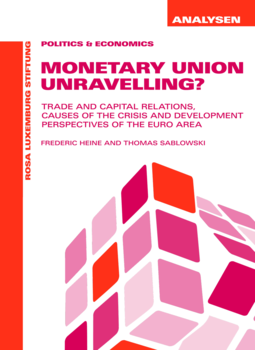
Europe can’t get rid of its crisis. Seven years of bank rescue loans, economic stimulus, state bailouts, austerity, ECB emergency measures, as well as countless reforms at the EU and EU member state level have not been able to prevent the most recent deepening of Greece’s debt crisis. Nor have they been able to halt the European economic growth crisis, the social costs of which have been imposed mainly on workers and vulnerable groups in the periphery of the euro area. At the same time, disagreement over how to end this crisis is growing.
These publication critically revisit certain explanations of the crisis. The authors base their findings not only on theoretical considerations, but also on an analysis of the changes in trade and capital relations in the euro area that occurred before and after the outbreak of the ‘Great Crisis’. They treat trade and capital relations as the economic basis of European integration. Analysing these ties not only provides a deeper insight of the underlying causes of the crisis, it also allows an evaluation of
the perspectives of European Monetary Union. They argue that the euro crisis is far better explained by financial than trade imbalances. At the same time, however, foreign trade played a crucial role in
the dynamic after the outbreak of the crisis. They show how Germany managed to shift the costs related to the risks taken by German banks onto the euro area, and how the country indirectly profited from the recession in the euro area as it was able to strengthen its global market position.
The criticism of Germany’s crisis policy has focussed too narrowly on the economic unreason of neomercantilism. It therefore misinterprets Germany’s mediumterm interests.